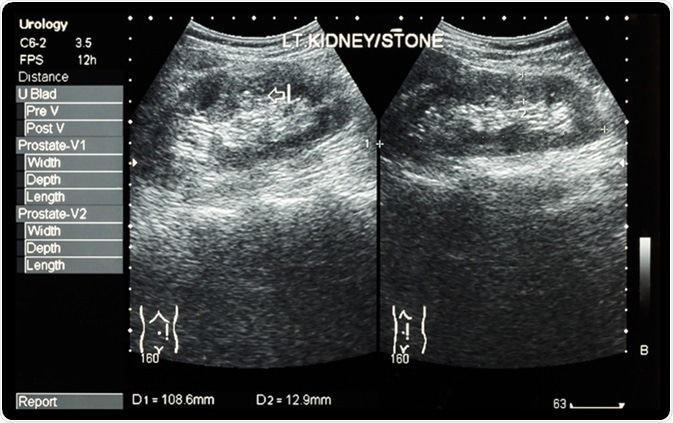Kidney stones are often asymptotic and cause no noticeable signs, which makes them difficult to diagnose. However, when the stone travels from the kidney to the bladder, it may get caught in the ureter. The stone can block urine flow from the kidney and cause swelling, discomfort and pain to affected individuals. Although there is no single or definite cause, there are quite a few factors that can heighten the risk of stone formation.

Ultrasonography of kidney : show left kidney stone. Image Credit: Puwadol Jaturawutthichai / Shutterstock
Symptoms
Individuals may experience a sharp, cramp-like pain in the side or back, which moves to the lower portion of the abdomen with time. The movement of stone in the urinary tract can shift the pain area; when the stone tries to come out of the body, it causes sudden pain of varied intensity.
Men could experience pain in the tip of their penis. Some women have reported that the pain is worse than that they experience during childbirth. Due to the presence of blood, the urine color may change to red or dark or contain red blood cells that may not be visible to the naked eye. Other than vomiting and nausea, a strong urge to pass urine and a burning sensation during urination are the general symptoms.
Kidney Stone Disease - Dr. Ann Becker
Causes
There are many possible causes of kidney stone formation, as outlined below.
Volume of Urine
The main risk associated with kidney stones is reduced production of urine. Heavy workouts and living or working in places that are hot or induce sweating can result in significant loss of body fluids. If individuals do not consume sufficient fluids, the body may become dehydrated and the volume of urine produced reduces to conserve fluids in the body.
This can cause the color of the urine to darken and the liquid to be more concentrated. It becomes more difficult for salts to dissolve in the urine and they may not be excreted. In such cases, consuming more fluid dilutes the concentration of the urine and hence the unwanted salt is excreted.
Increasing the intake of fluids, such as water, reduces the risk of kidney stone formation. A typical calculation shows that an intake of 100 ounces of fluid per day produces a minimum of 2.5 l of urine.
Food Intake
Food intake also has an effect on kidney stone formation because kidney stones (calcium stones are formed when the urine contains increased levels of calcium. Therefore, restricting calcium intake in the food may prevent stone formation. However, this can have negative effects on other areas of the body, such as the health of the bones. In some cases, a lower intake of calcium may reduce the risk of kidney stone formation; however, it is a rare scenario. The presence of higher levels of calcium in the urine does not necessarily depend on calcium intake and it is dependent on the ability of the body to manage calcium. Though physicians do not suggest calcium restrictions, higher intake is not recommended.
Intake of higher amounts of salt is a potential risk associated with calcium stone formation as excess salt is passed over and calcium is retained in the urine. Physicians generally advise people to use less salt in the food they consume as it may help to prevent calcium stone formation.
Consumption of high-oxalate foods may increase the risk of calcium oxalate stone formation. Diets that are rich in animal protein, such as fish, pork, beef, and chicken, can increase acid levels in urine and the body, possibly resulting in the formation of stones. When the meat is broken down into uric acid, the chances of formation of uric acid stones and calcium stones are higher.
Medications and Medical Conditions
Medications such as supplements for Vitamin C may increase the risk of stone formation.
When the growth of parathyroid glands is abnormal, the calcium levels are higher in urine and blood as these glands control the metabolism of calcium, and may result in stone formation in the kidney. Medical conditions such as distal renal tubular acidosis increase the risk of calcium phosphate stone formation due to increased acid levels in the system.
In ulcerative colitis or Crohn’s Disease, diarrhea is caused due to bowel conditions. As a result, dehydration is common and often reduces the volume of urine. Surgeries similar to gastric bypass surgery can increase the chance of calcium oxalate stone formation in the kidney. As the body absorbs more oxalate (from the intestine), the excess oxalate is found in urine. Increased levels of oxalate in the urine and reduced urine volume result in the formation of calcium oxalate stones in the kidney.
In obese individuals, the composition of the acid levels may be changed in the urine, which can form stones.
Some unusual and innate disorders also lead to the development of some types of stones. For example, in conditions such as cystinuria, urine analysis reveals increased levels of amino acid cysteine and in the case of primary hyperoxaluria, the liver produces more oxalate.
There is also a higher chance of kidney stone when it runs in the family, such as if a sibling or parent has a kidney stone.
Last Updated: Apr 14, 2021